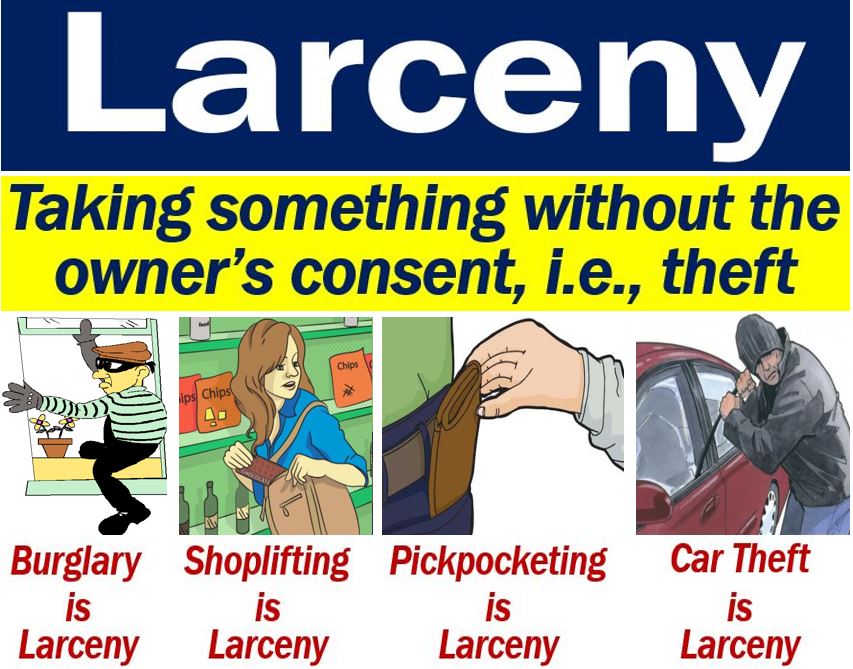Larceny – definition and meaning
Larceny is the illegal taking of somebody’s personal property with the aim of depriving them of it permanently. The person taking the property intends to become its owner. In other words, it involves taking away a person’s property without their consent or against their will. It is usually a non-violent crime.
Studies have shown that individuals who commit larceny may experience psychological consequences, including guilt, anxiety, and in some cases, a compulsion to repeat the offense.
Victims of larceny can suffer significant emotional distress and financial instability, which highlights the importance of robust legal frameworks to deter such crimes.
United Kingdom & Ireland
The term no longer exists in England, Wales, Northern Ireland, Scotland, and the Republic of Ireland. The authorities in those countries broke down the term into specific crimes, such as theft, robbery, fraud, and burglary.
United States
In the United States and New South Wales in Australia, however, people still use the term. In those countries and regions, it involves the taking and carrying away of somebody’s personal property without their consent. It means ‘theft’ or ‘stealing.’
The Merriam-Webster dictionary has the following definition of the term:
“The unlawful taking of personal property with intent to deprive the rightful owner of it permanently.”
A person who commits this type of crime is a larcenist.

Etymology of larceny
Etymology is the study of the origin of words and how their meanings have evolved.
The Online Etymology Dictionary says that the word emerged in Britain in the late fifteenth century. It meant “theft, wrongful or fraudulent taking of personal goods of another with felonious intent.” It came from Anglo-French ‘Larcin.’
The Old French word ‘Larcin, Lerrecin,’ meaning “robbery, theft” came from Latin ‘Latrocinium.’ ‘Latrocinium’ meant “robbery, free-booting, piracy, highway robbery.”
The Latin word ‘Latro’ meant “bandit, robber,” as well as “mercenary, hireling.” The Latin word came from the Greek word ‘Latron,’ which meant “pay, hire, wages.”
Grand and petty larceny
When we add the words ‘petty’ or ‘grand,’ we are talking about the value of the property that somebody stole.
-
Grand
In most of the US, grand larceny involves the taking of property worth at least $400 or $500. The term refers to property worth $1,000 or more in New York.
In Virginia, however, the threshold is just $5 if somebody took it directly from a person. The threshold is $200 if they took it indirectly.
Grand larceny is a felony in the United States. In common law countries, a felony is a serious crime.
-
Petty
Petty larceny, in the US, refers to the theft of something that is not worth much. ‘Not worth much,’ in this context, means possessions worth less than $500 or $400.
Legal-dictionary.thefreedictionary.com says the following regarding the term:
“Petty larceny is a misdemeanor punishable at maximum with a term in the county jail. States which only use the term ‘larceny,’ often treat theft of smaller amounts as a misdemeanor in sentencing.”
A misdemeanor is a ‘lesser’ criminal act, i.e., a crime, but not a serious one.
The term may refer to physically stealing something, or white collar crime. White collar, in this context, means office-based work. For example, a bank clerk is a white collar worker.
Parts of speech
The word ‘larceny’, a noun, does not have a direct verb, adjective, or adverb form in standard English usage.
If you want to express the action, you could say ‘to commit larceny,’ or simply ‘to steal’.
The adjective ‘larcenous’, which means ‘thievish,’ does exist. However, it is hardly ever used and many people probably wouldn’t understand it.
Video – What is Larceny?
This video, from our sister channel on YouTube – Marketing Business Network, explains what ‘Larceny’ is using simple and easy-to-understand language and examples.

